
This book challenges the conventional wisdom that gasoline taxation, an important and much-debated instrument of climate policy, has a disproportionately detrimental effect on poor people. Increased fuel taxes carry the potential to mitigate carbon emissions, reduce congestion, and improve local urban environment. As such, higher gasoline taxes could prove to be a fundamental part of any climate action plan. However, they have been resisted by powerful lobbies that have persuaded people that increased fuel taxation would be regressive. Reporting on examples of over two dozen countries, this book sets out to empirically investigate this claim. The authors conclude that while there may be some slight regressivity in some high-income countries, as a general rule, fuel taxation is a progressive policy particularly in low income countries. Rich countries can correct for regressivity by cutting back on other taxes that adversely affect poor people, or by spending more money on services for the poor. Meanwhile, in low-income countries, poor people spend a very small share of their money on fuel for transport.

In 1992, governments gathered for the United Nations Conference on Environment and Development in Rio de Janeiro. The “Rio Declaration” laid out several principles of sustainable development, including the central role of policy instruments. This article takes stock of where we stand today in implementing sound and effective environmental policy instruments throughout the world, particularly in developing and transitional economies. It agures that, as our experience with market-based environmental policies has deepened over the past two decades, so has the ability to adapt instruments to complicated and heterogeneous contexts—but we are only just beginning, and the need to be further along is dire. One key factor may be that economists have not yet meaningfully accounted for the importance of political feasibility, which often hinges on risks to competitiveness and employment, or on the distribution of costs rather than on considerations of pure efficiency alone.
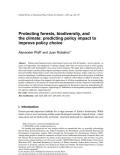
Policies must balance forest conservation’s local costs with its benefits—local to global—in terms of biodiversity, the mitigation of climate change, and other eco-services such as water quality. The trade-offs with development vary across forest locations. This article argues that considering location in three ways helps to predict policy impact and improve policy choice: (i) policy impacts vary by location because baseline deforestation varies with characteristics (market distances, slopes, soils, etc.) of locations in a landscape; (ii) different mixes of political-economic pressures drive the location of different policies; and (iii) policies can trigger ‘second-order’ or ‘spillover’ effects likely to differ by location. This article provides empirical evidence that suggests the importance of all three considerations, by reviewing high-quality evaluations of the impact of conservation and development on forest. Impacts of well-enforced conservation rise with private clearing pressure, supporting (i). Protection types (e.g. federal/state) differ in locations and thus in impacts, supporting (ii).
The objective of this research is to identify and quantify the motivations for organic grain farming in the United States. Survey data of US organic grain producers were used in regression models to find the statistical determinants of three motivations for organic grain production, including profit maximization, environmental stewardship, and an organic lifestyle. Results provide evidence that many organic grain producers had more than a single motivation and that younger farmers are more likely to be motivated by environmental and lifestyle goals than older farmers. Organic grain producers exhibited a diversity of motivations, including profit and stewardship.
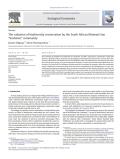
The restitution of parkland to the Khomani San “bushmen” and Mier “agricultural” communities in May 2002 marked a significant shift in conservation in the Kgalagadi Transfrontier Park and environs in South Africa. Biodiversity conservation will benefit from this land restitution only if the Khomani San, who interact with nature more than do other groups, are good environmental stewards. To assess their attitude toward biodiversity conservation, this study used the contingent valuation method to investigate the economic values the communities assign to biodiversity conservation under three land tenure arrangements in the Kgalagadi area. For each community and land tenure arrangement, there are winners and losers, but the winners benefit by more than the cost that losers suffer. The net worth for biodiversity conservation under the various land tenure regimes ranged from R928 to R3456 to R4160 for municipal land, parkland, and communal land respectively for the Khomani San, compared to R25 600 to R57 600 to R64 000 for municipal land, parkland, and communal land respectively for the Mier.
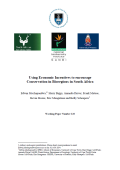
Many protected areas are not successfully conserving biodiversity, often despite adequate management within their borders. Changes in land use outside protected areas can alter ecological function inside protected areas and result in biodiversity loss given that protected areas are almost always parts of larger ecosystems. Economic incentives are seen as one of the most promising avenues to influence conservation goals. This paper deals with enabling these in the now commonly accepted notion of bioregional landscape management. It suggests a holistic framework to help understand where and how such incentives may function. It then discusses a range of desired incentives, and relate as many of these as possible to potential underlying institutional changes. Without going into country-specific details, several southern African examples are used, all the while relating both principles and examples to bioregionalism. We conclude that incentives for bioregional conservation in southern Africa are far more likely to succeed if key institutions can be introduced.
Global warming and other impending environmental mega-problems call for a new technological paradigm. The urgency of the development and deployment of technological solutions is such that governments will need to make widespread use of ‘carrots and sticks’ to ensure that next-generation technologies are developed and deployed, more demanding standards and regulations are applied and stricter enforcement is guaranteed. To capture the main elements of this paradigm shift, we introduce the concept of Sustainability-oriented Innovation Systems (SoIS). SoIS make particularly high demands on governance, because governments need to disrupt unsustainable technological pathways and encourage alternative technologies long before they reach the stage of commercial viability. This implies picking winners in situations of technological uncertainty and highly disparate stakeholder preferences. SoIS also build on new types of policies that help to internalise environmental costs. The policy-driven nature of technological development may possibly result in a wide divergence of national technological trajectories.
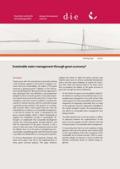
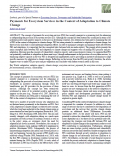
The concept of payments for ecosystem services (PES) has recently emerged as a promising tool for enhancing or safeguarding the provision of ecosystem services (ES). Although the concept has been extensively scrutinized in terms of its potential positive and negative impacts on the poor in developing countries, less attention has been paid to examining the role of PES in the context of adaptation to climate change. PES has some potential to contribute to adaptation to climate change, but there are also risks that it could undermine adaptation efforts. In order to maximize synergies and minimize trade-offs between PES and adaptation, it is important that the conceptual links between both are made explicit. The present article presents the main conceptual links between PES and adaptation to climate change and suggests ways of making PES pro-poor and pro-adaptation.
